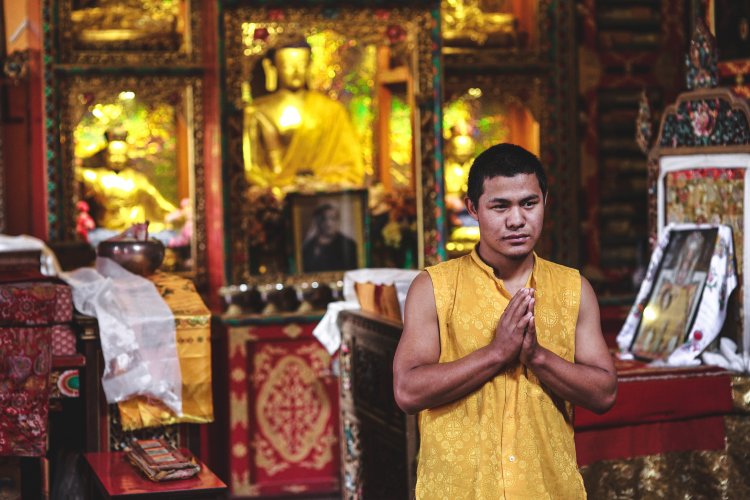Man Sentenced to Two Years in Prison for “Inciting Separatism”

29.11.2022
Fleur Harmsen
Tibet and Human Rights Researcher,
Global Human Rights Defense.
Chinese authorities in Karze County detained ThupSam, a Tibetan man, after accusing him of leaking “state secrets” outside Tibet. The Chinese authorities claim that he was “splitting the nation” and “endangering state security” through sending information about Tibet to Europe and India via WeChat, a Chinese social messaging app (Lhamo, 2022). He was sentenced to two years in prison (Dolma, 2022).
Prior to his sentencing, Chinese authorities held the 28-year-old man in incommunicado detention during five months, when he was tortured and beaten (Lhamo, 2022). ThupSam’s family was summoned to court on the 21st of November, where the authorities informed them he had been sentenced to prison, without any notice to the family before the trial (Lhamo, 2022).
ThupSam’s arrest comes after a wave of incarceration of activists, teachers, intellectuals and monks who speak out about the Chinese repression in Tibet (Dolma, 2022). Such incarcerations defy international human rights law.
Article 1 of the Convention Against Torture (CAT) explains that “torture” encompasses all acts that intentionally inflict severe pain or suffering, wether physical or mental, for obtaining information, punishing or intimidating and coering an individual for any reason based on discrimination of any kind. This right cannot be derogated from as it is a jus cogens principle of international law. China’s torture of the ThupSam violates article 1 of the CAT.
In addition, holding individuals in incommunicado detention amounts to a violation of the CAT. Incommunicado detention occurs when an individual is denied correspondence with anyone outside of the center and their family, loved ones and acquaintances are not given information about the individual’s whereabouts and well-being. In the ruling Francisco Larez v Bolivarian Republic of Venezuela, the Committee Against Torture stipulates that incommunicado detention in itself constitutes a form of torture within the meaning of article 1 of the UNCAT (Francisco Larez v. Bolivarian Republic of Venezuela, pp. 6.4). According to the Committee, the suffering caused by incommunicado detention amounts to torture due to the severe stress and cruel treatment endured by the detainee. In this regard, China violated the CAT on two occasions.
In addition, Article 3 of the Universal Declaration of Human Rights (UDHR) states that all individuals have the right to life, liberty and security of person. This right ensures that no one shall be subjected to arbitrary detention and arrest. It also ensures that, when deprived of one’s liberty, that individual in question will be treated with humanity and with dignity. China is seen to violate this right through arbitrarily arresting ThupSam, who was merely practicing his right to correspondence and freedom of expression, stipulated under article 12 of the Universal Declaration of Human Rights,
In addition, Article 19 of the UDHR protects the right to freedom of opinion and expression. The right to freedom of opinion in this article is absolute, disallowing the state from derogating from this right. The right to freedom of expression, however, is subject to certain restrictions based on article 29(2) of the UDHR. The scope of article 19 is broad as it protects the right to seek, receive and impart information and ideas of all kinds regardless of frontiers. Any restriction on the right to freedom of expression must thus be in line with article 29 of the UDHR, determined by law and “for the purpose of securing due recognition and respect for the rights and freedoms of others and of meeting the just requirements of morality, public order and the general welfare in a democratic society”. Therefore, the state must demonstrate that the restriction of this right is compatible with the requirements of article 29. However, ThupSam’s arrest and detention is not justifiable under article 29 of the UDHR as he was not representing a significant threat to the nation and he was merely acting on his fundamental right to freedom of expression.
Sources and further reading:
Dolma, Y. (2022, November 24). China jailed a young Tibetan for two years for allegedly sending information to the world. The Tibet Post. Retrieved November, 29, 2022, from https://www.thetibetpost.com/en/news/132-tibet/7465-china-jailed-a-young-tibetan-for-two-years-for-allegedly-sending-information-to-the-world
Lhamo, C. (2022, November 26). Tibetan youth sentenced to two years for “leaking state secrets” in Kardze. Phayul Newsdesk. Retrieved November, 29, 2022, from https://www.phayul.com/2022/11/26/47733/

































